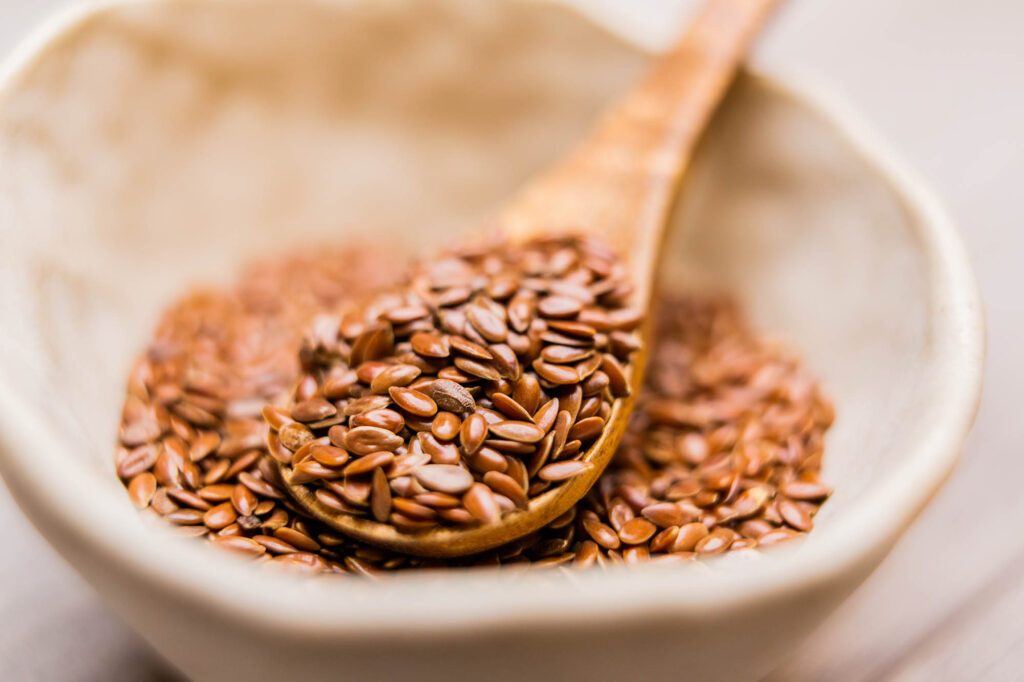Flaxseeds or linseeds (they are pretty much the same thing) are one of the most well-known foods for promoting hormone balance, especially estrogen balance. Flaxseeds contain an impressive array of nutrients and are particularly high in fibre and omega 3. They are best known for their phytoestrogen content which acts to help balance estrogen levels.
Here are the reasons flax seeds are wonderful for hormone balance.
Fibre: Flaxseeds are particularly high in fibre. Just one tablespoon of ground flax seeds contains about 2g of fibre. This is almost 10% of the recommended dietary intake for women (1). Flax seeds contain both soluble and insoluble fibre. Combined these fibres help to prevent chronic diseases by lowering cholesterol and preventing type 2 diabetes as well as help keep bowel movements regular. Fibre is especially important for women of reproductive age to help clear out excess or unwanted estrogens from the gut. Vegetarian women that naturally have a higher fibre diet have been shown to excrete 2-3 times more estrogen in their stools (2) which may be one of the reasons vegetarian women have lower rates of breast cancer (2). The large intestine is home to the estrobolome, which is a specific subset of bacteria responsible for managing the excretion and absorption of estrogen. An enzyme called beta-glucuronidase is responsible for unpackaging the inactive estrogen that was packaged by the liver reactivating it and sending it back into circulation (3). Fibre helps keep the estrobolome balanced and ensures that more estrogen is removed rather than being reabsorbed.
Phytoestrogens: Flaxseeds are particularly high in phytoestrogens called “lignans.” Phytoestrogens are a type of polyphenol that has the ability to weakly bind to estrogen receptors in the body. They are not real estrogen and are 100- 1000 times weaker than our bodies’ own natural estrogen. Phytoestrogens have both an estrogenic and anti-estrogenic effect, meaning they can raise or lower estrogen in the body as needed depending on the target tissue. Phytoestrogens have a greater affinity to beta estrogen receptors which has protective and balancing effects (5). In fact, one study showed that the beneficial effects of phytoestrogens from flax seeds were even stronger than from soy (4). Due primarily to the phytoestrogen content, flax seeds have been found especially helpful in the prevention of breast cancer (6) as well as cyclical breast pain (7).
Blood Sugar Balance: Blood sugar dysregulation is often a root cause of hormonal imbalances. It is most commonly seen in women with PCOS or in perimenopause that have underlying insulin resistance, but it also contributes to worsening PMS symptoms as blood sugar becomes less stable in the luteal phase. A review of over 25 different studies has confirmed that flaxseed consumption can help decrease blood sugar levels and decrease insulin resistance (8). This is likely due to the soluble fibre which has profound action on blood sugar. As insulin resistance is one of the main driving factors behind weight gain, flax seeds have also been shown to be beneficial in aiding weight loss (9). The soluble fibre in flaxseeds also increases feelings of satiety or fullness which leads to less overeating and greater weight loss (9).
Omega 3: Flaxseeds are a rich source of ALA plant omega 3’s which are needed to help fight inflammation (10). ALA is then converted into EPA and DHA in the body. All of these omega types are important but ALA is particularly important for lowering inflammation. For this reason, they can be beneficial in treating inflammatory hormonal conditions such as endometriosis and fibroids etc omega 3 has been found especially important in helping to reduce period pain (11).
Tryptophan: Flaxseeds are high in an amino acid called tryptophan. Tryptophan, magnesium and vitamin b6 are the building blocks of the neurotransmitters serotonin and melatonin. Serotonin is a happiness neurotransmitter that converts to melatonin at night to aid with sleep. Its function is enhanced by estrogen and vice versa. Flax seeds contain a good amount of tryptophan, magnesium as well as omega 3 which helps to regulate serotonin. Overall they are a wonderful food to eat for both serotonin and estrogen balance and help to support good moods and fight depression and anxiety.
How to prepare flax seeds for maximum benefit
It is interesting to me that many women are aware of the powerful effects of flax seeds for hormone balance and yet are not taught how to properly prepare flax seeds in order to get the full benefit out of them. Nearly every study I have come across on flax seeds only uses ground flax seeds. This is because whole flax seeds can not be properly broken down in the digestion and usually pass right through without breaking down. Furthermore, it is important to use freshly ground flax seeds as opposed to pre-ground flax seeds (I love using Australian grown flaxseeds from Red Tractor Farms). This is because once the flax seeds have been ground the omega 3 and omega 6 content oxidises within a few hours and loses some of its anti-inflammatory benefits. Pre-ground flaxseed from the store is already oxidised. This includes mixes such as LSA which has ground linseed in it (linseed is the same as flaxseed). The best way to consume flaxseed is freshly ground in a high-speed blender and then immediately frozen in an airtight container or jar. I like to grind a big batch of 1-2 cups at a time. Once frozen they can be used just like regular ground flax seeds, they don’t need any defrosting. When flax seed is combined with water it gels. As far as I am aware this stops the omega’s from oxidising and so can be used in different recipes or to cook with etc. Gelled flax seed is wonderful for the gut microbiome and for gut motility however benefits for hormone balance occur mostly with ground flax seeds, at least this is the way that they are always studied in the research. Recommended intake is generally 1-2 TBSP of ground flax seeds daily for maximum benefit.
Some people may have heard online that flax seeds are dangerous because they contain cyanide. It is true that flaxseeds contain some cyanide in them, however this generally is not concerning when flax seeds are eaten in normal amounts. Many foods contain cyanide. The human body has an enzyme which helps eliminate most of the cyanide from the foods we eat. Eating 1 cup of raw ground flax seeds a day or close to 15 TBSP may put some people at risk of cyanide toxicity, although this doesn’t seem to be well-proven in the research yet and its not likely that anyone would choose to eat that amount daily. Cooking or baking with flax seeds removes almost all of the cyanide especially when flaxseeds are combined with a liquid. Cooking flax seeds does not significantly change the nutrition of flax seeds.
Flaxseed oil is a very healthy oil to consume. It contains concentrated amounts of the ALA Omega 3 and is a great way to boost omega 3 in the diet, especially when used appropriately and not heated (best used for cold salad dressings or smoothies etc). ALA Omega 3 is the most beneficial type of omega for lowering inflammation (I use my cold-pressed flaxseed oil from Plenty Foods). However flax seed oil does not have any fibre or any lignans, so it does not have the same effects on estrogen balance as ground flax seeds.
References:
(1)Akbar A, Shreenath AP. High Fiber Diet. [Updated 2021 May 9]. In: StatPearls [Internet]. Treasure Island (FL): StatPearls Publishing; 2022 Jan-. Available from: https://www.ncbi.nlm.nih.gov/books/NBK559033/?report=classic
(2) Goldin, B. R., Adlercreutz, H., Dwyer, J. T., Swenson, L., Warram, J. H., & Gorbach, S. L. (1981). Effect of diet on excretion of estrogens in pre-and postmenopausal women. Cancer Research, 41(9 Pt 2), 3771–3773.
(3) Ervin, S. M., Li, H., Lim, L., Roberts, L. R., Liang, X., Mani, S., & Redinbo, M. R. (2019). Gut microbial β-glucuronidases reactivate estrogens as components of the estrobolome that reactivate estrogens. The Journal of biological chemistry, 294(49), 18586–18599. https://doi.org/10.1074/jbc.RA119.010950
(4) Brooks, J. D., Ward, W. E., Lewis, J. E., Hilditch, J., Nickell, L., Wong, E., & Thompson, L. U. (2004). Supplementation with flaxseed alters estrogen metabolism in postmenopausal women to a greater extent than does supplementation with an equal amount of soy. The American journal of clinical nutrition, 79(2), 318–325. https://doi.org/10.1093/ajcn/79.2.318
(5) Calado, Ana & Neves, Pedro & Santos, Teresa & Ravasco, Paula. (2018). The Effect of Flaxseed in Breast Cancer: A Literature Review. Frontiers in Nutrition. 5. 10.3389/fnut.2018.00004.
(6) Calado, Ana & Neves, Pedro & Santos, Teresa & Ravasco, Paula. (2018). The Effect of Flaxseed in Breast Cancer: A Literature Review. Frontiers in Nutrition. 5. 10.3389/fnut.2018.00004.
(7) Vaziri, F., Zamani Lari, M., Samsami Dehaghani, A., Salehi, M., Sadeghpour, H., Akbarzadeh, M., & Zare, N. (2014). Comparing the effects of dietary flaxseed and omega-3 Fatty acids supplement on cyclical mastalgia in Iranian women: a randomized clinical trial. International journal of family medicine, 2014, 174532. https://doi.org/10.1155/2014/174532
(8) Mohammadi-Sartang, M., Sohrabi, Z., Barati-Boldaji, R., Raeisi-Dehkordi, H., & Mazloom, Z. (2018). Flaxseed supplementation on glucose control and insulin sensitivity: a systematic review and meta-analysis of 25 randomized, placebo-controlled trials. Nutrition reviews, 76(2), 125–139. https://doi.org/10.1093/nutrit/nux052
(9) Mohammadi-Sartang, M., Mazloom, Z., Raeisi-Dehkordi, H., Barati-Boldaji, R., Bellissimo, N., & Totosy de Zepetnek, J. O. (2017). The effect of flaxseed supplementation on body weight and body composition: a systematic review and meta-analysis of 45 randomized placebo-controlled trials. Obesity reviews : an official journal of the International Association for the Study of Obesity, 18(9), 1096–1107. https://doi.org/10.1111/obr.12550
(10) Parikh, M., Maddaford, T. G., Austria, J. A., Aliani, M., Netticadan, T., & Pierce, G. N. (2019). Dietary Flaxseed as a Strategy for Improving Human Health. Nutrients, 11(5), 1171. https://doi.org/10.3390/nu11051171
(11) Harel, Z., Biro, F. M., Kottenhahn, R. K., & Rosenthal, S. L. (1996). Supplementation with omega-3 polyunsaturated fatty acids in the management of dysmenorrhea in adolescents. American journal of obstetrics and gynecology, 174(4), 1335–1338. https://doi.org/10.1016/s0002-9378(96)70681-6












I found this article fascinating and enlightening. I didn’t know that the pre ground flax meal from the supermarkets had already lost its potency. I also didn’t know you can ground it and then freeze. Does it freeze solid? How easy can you get a spoonful without defrosting the whole thing?
When you freeze flax seeds nothing changes, you can use than just as fresh, they don’t need any defrosting. They spoon out the same as fresh.
Do you suggest any specific dosages for women trying to balance hormones?
The dosage is 1 or 2 ground tablespoons daily
The detailed breakdown of how flaxseeds support hormonal health through their rich fiber, phytoestrogens, and omega-3 content was truly enlightening. The practical tips on how to properly prepare and incorporate flaxseeds into our diet for maximum benefit were also highly appreciated.